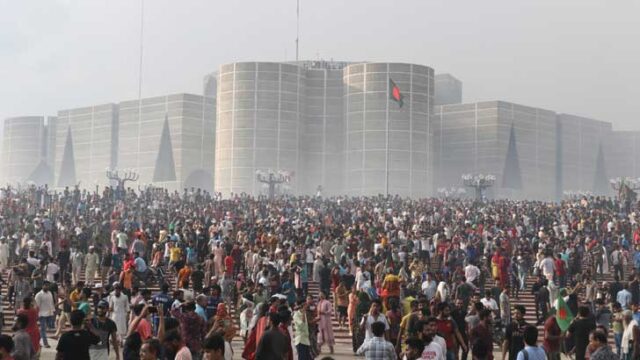In a recent interview with Reuters, Sajeeb Wazed Joy, son of Sheikh Hasina, claimed that his mother has not resigned and remains the Prime Minister of Bangladesh according to the constitution. However, this assertion has been met with strong rebuttals from constitutional experts who argue that the claim is unfounded and baseless.
Expert Rebuttal on the Prime Minister’s Status
Constitutional expert Arif Khan has dismissed Joy’s claim as lacking any legal or factual basis. Speaking to a news outlet on Saturday, Khan emphasized that the confidentiality of discussions between the Prime Minister and the President means that the specifics of their conversations are known only to them. However, he clarified that once the President confirms the resignation of the Prime Minister, it should be accepted as conclusive.
Khan further explained that the resignation of a Prime Minister does not necessitate a public declaration on state television. According to the constitution, the act of resignation is valid once the Prime Minister submits their resignation to the President. The President’s confirmation is sufficient and final, regardless of whether a written letter was provided. Therefore, Joy’s claim that Sheikh Hasina remains the Prime Minister is not constitutionally valid.
Context of the Resignation and Constitutional Implications
The constitutional expert highlighted that during moments of public uprising or war, resignation does not require a public announcement. The current situation in Bangladesh, marked by a successful popular uprising, does not fit the usual scenarios covered by the constitution. He noted that the army chief, the President, and student leaders have assumed varying degrees of authority, creating a new governance structure outside the traditional constitutional framework.
Khan pointed out that, under normal circumstances, the constitution provides for two potential outcomes following a Prime Minister’s resignation: either the President appoints another qualified individual as Prime Minister, or, in the absence of such a person, the outgoing Prime Minister advises the President to dissolve Parliament and arrange for new elections within three months. During this period, the outgoing Prime Minister and their cabinet would remain in office to manage routine affairs until the elections are held.
However, he stressed that these provisions are designed for normal times, not for the extraordinary situation Bangladesh currently faces following a successful uprising. The constitution was not written with scenarios like a Prime Minister committing atrocities against their own people or fleeing the country in mind. As a result, Bangladesh’s current reality necessitates actions beyond what is outlined in the constitution.
The Role of the Interim Government
Arif Khan also commented on the legitimacy of the current interim government, which was formed following the recent uprising. He asserted that, following a successful revolution, the power effectively shifts to the revolutionary people, and the immediate need is for a de facto government to restore order and administration. This government, despite not being constitutionally mandated, is necessary to prevent chaos and is therefore legitimate. Attempts to challenge its validity in court, according to Khan, would likely be dismissed.
Comparisons to Past Uprisings
Khan drew parallels between the current situation and the 1990 uprising in Bangladesh, where similar actions were taken to form an interim government despite the absence of explicit constitutional provisions. In that instance, the subsequent Twelfth Amendment to the constitution provided retroactive legitimacy to the actions taken during the uprising. He suggested that a similar approach may be necessary to provide constitutional and legal validity to the current interim government’s actions.
Conclusion
The ongoing debate over Sheikh Hasina’s status as Prime Minister highlights the complex constitutional challenges Bangladesh faces in the aftermath of a popular uprising. As the country navigates this period of transition, the focus must be on ensuring a smooth and legitimate transfer of power. The formation of a de facto government, while outside the traditional constitutional framework, is seen as essential to maintaining order and guiding the country towards a stable democratic process. Future amendments may be required to provide legal and constitutional legitimacy to the actions taken during this tumultuous period.










